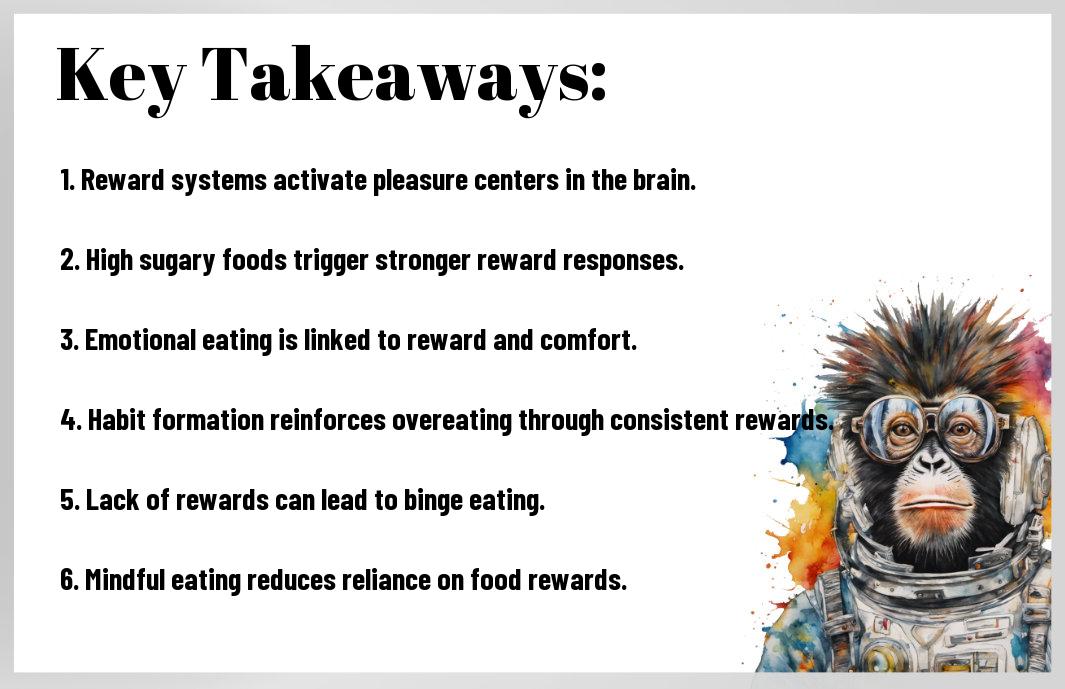You may not realize it, but your brain’s reward systems play a significant role in your relationship with food. When you eat, your brain releases feel-good chemicals that reinforce the behavior, making you more likely to overindulge, especially in high-calorie foods. This can create a cycle of compulsion that’s difficult to break, often leading to unwanted weight gain and poor health outcomes. Understanding the impact of these systems can empower you to take control of your eating habits and make healthier choices.
Key Takeaways:
- Reward systems can create a cycle where eating is positively reinforced, leading to habitual overeating as individuals seek to replicate the pleasure associated with food consumption.
- Understanding the psychological triggers linked to reward systems can help individuals develop healthier eating patterns and break the cycle of emotional eating.
- Implementing alternative reward mechanisms, such as non-food incentives, can assist in reducing reliance on food for emotional satisfaction and minimizing the compulsion to overeat.

Understanding Reward Systems
For anyone looking to understand the dynamics of behavior, the workings of reward systems play a pivotal role. In the context of eating behaviors, reward systems are the mechanisms in our brains that reinforce certain actions through feelings of pleasure and satisfaction. When we engage in activities that lead to a reward, such as eating a delicious meal, our brain releases neurotransmitters like dopamine that make us feel good, thus encouraging us to repeat that behavior in the future.
Definition of Reward Systems
Across various scientific disciplines, reward systems can be defined as biological processes that govern our motivations and behavior. These systems can be activated by pleasurable stimuli, leading to the release of neurotransmitters that create feelings of enjoyment. In essence, the reward systems in our brains are designed to encourage behaviors that promote survival, like eating, but can also lead to overindulgence when triggered too frequently.
Types of Reward Systems
Among the various types of reward systems, you will often encounter intrinsic and extrinsic rewards that fundamentally shape our relationship with food. Understanding these distinctions can be crucial for recognizing how they might push us toward overeating. Intrinsic rewards derive from internal satisfaction—like the joy of cooking a wholesome meal—while extrinsic rewards come from external sources such as social validation or advertising that promotes unhealthy food choices. Here’s a brief rundown of some key types of reward systems:
| Type | Description |
| Intrinsic | Internal satisfaction from healthy foods |
| Extrinsic | Influences from culture and society |
| Biological | Natural responses triggering food cravings |
| Emotional | Food as comfort during stress |
| Social | Sharing meals as an avenue for bonding |
To truly grasp the implications of these reward systems, it’s valuable to reflect on how they influence your decisions. For instance, a biological reward may compel you to seek out fast food when you’re stressed, while social rewards might encourage you to indulge during gatherings. Below is a summary of key aspects of these systems:
- Intrinsic Rewards: Internal satisfaction from healthy choices
- Extrinsic Rewards: External motivations, such as advertising
- Biological Responses: Natural cravings influenced by neurotransmitters
- Emotional Triggers: Using food as a comfort in challenging times
- Social Influences: Feeling pressured to overeat in social settings
Knowing how these various systems function can help you make conscious food choices, thereby impacting your relationship with food and your eating behavior.


The Brain’s Role in Overeating
While the brain is a complex organ, its role in our eating behaviors, especially the compulsion to overeat, is a compelling area of study. Our brain’s reward system drives us to seek out pleasurable experiences, including food consumption. When we eat, the brain releases neurotransmitters such as dopamine, which signals pleasure and satisfaction. However, this reward mechanism can become maladaptive, leading to overeating and food addiction. A fascinating approach to mitigating this issue is described in a study titled A pilot randomized trial of reward re-training treatment, which suggests that retraining how our brain responds to food rewards may help control compulsive eating behaviors.
Neurotransmitters and Compulsion
Neurotransmitters play a significant role in our eating habits and compulsive behaviors. In particular, dopamine is associated with reward-seeking behavior and motivation, which helps explain why certain foods can become irresistible. When you indulge in sugary or fatty foods, your brain releases dopamine, reinforcing the behavior and contributing to a cycle of overeating. Over time, this can lead to a heightened sensitivity to these foods, making it even more challenging to resist them.
The Pleasure Principle
Overeating is often driven by the pleasure principle, which posits that humans are motivated to seek out pleasure and avoid pain. In the context of food, calorie-dense options are particularly enticing because they provide immediate gratification. You may find yourself reaching for these foods during emotional lows or stressful situations to seek comfort, leading to a cycle where your brain craves that hit of dopamine repeatedly. This reliance on food as a source of instant pleasure can overshadow healthier eating habits.
Further, the impacts of overeating extend beyond just physical health; they can affect your mental well-being and resilience against stress. As you continually turn to food for comfort, a dependency can form, making it difficult to break free from this rewarding cycle. Understanding the connection between your brain’s reward pathways and your eating habits can empower you to make changes that foster a healthier relationship with food.
Psychological Factors in Overeating
Not everyone understands that psychology plays a significant role in the compulsion to overeat. Various factors stimulate this behavior beyond mere hunger. Here are some of the psychological aspects I often consider:
- Emotional triggers
- Behavioral conditioning
- Cognitive distortions
When I explore into why some individuals struggle with overeating, I find that their emotional states can heavily influence their eating habits. It may not always be about physical hunger; rather, it can stem from deeper psychological issues such as anxiety, depression, or stress. Recognizing these factors is crucial for understanding one’s eating patterns.
Emotional Triggers
At times, I notice that emotions can serve as powerful triggers for eating. Many people, myself included, may turn to food for comfort during stressful moments or to celebrate joyous occasions. Foods often become associated with specific emotions, leading to the commonly held belief that eating can provide emotional relief. This connection might significantly increase the frequency of overeating when I’m feeling particularly overwhelmed or even elated.
Behavioral Conditioning
With repeated experiences over time, our brains can become conditioned to respond to certain cues with the desire to eat. This learned behavior happens often in environments filled with rewarding stimuli, where I associate the act of eating with positive outcomes, such as pleasure or relaxation. For example, when I reward myself with a treat after completing a task or when I feel bored, I inadvertently reinforce the habit of overeating.
Psychological conditioning also manifests through social influences and cultural norms that glorify food as a celebration or escape. It’s important to recognize that this conditioning can make it difficult to break the cycle of overeating, as these behaviors can be deeply entrenched in our daily lives. These patterns reinforce the compulsion to overeat, making it vital for you to understand the role of these psychological influences to cultivate healthier eating habits.
Impact of External Factors
Unlike the internal mechanisms that guide our eating habits, external factors play a significant role in shaping our relationship with food and can often drive our compulsion to overeat. These external influences can manifest in various ways, impacting decisions around food consumption. Some of the key external factors include:
- Environmental Cues
- Social Influences
- Marketing Strategies
Assume that you are surrounded by sights, smells, and sounds that trigger your desire for certain foods. These environmental cues can create a strong compulsion to eat, often overriding your internal satiety signals. It is crucial to recognize these factors as they can lead to a habitual pattern of overeating.
Environmental Cues
After reflecting on my own eating habits, I realized how prevalent environmental cues are in my day-to-day life. These cues can be anything from the aroma of freshly baked cookies wafting through the air to the sight of juicy burgers on billboards as I drive by. They often evoke feelings of hunger, even when I am not physically hungry. Being aware of these cues allows me to make more conscious decisions about when and what to eat, rather than succumbing to impulsive urges triggered by my environment.
Social Influences
Influences from family and friends also play a significant role in my eating behavior. The dynamics of social interactions often lead to scenarios where I’m encouraged to eat more than I normally would. Whether it’s during gatherings, parties, or simply mealtime with loved ones, the pressure to indulge can be overwhelming. This is coupled with the positive perceptions of sharing food over laughter and bonding, which can sometimes mask the negative impact it might have on my compulsion to overeat.
Understanding the power of social influences and their effect on your eating habits is vital. I’ve noticed that certain social settings, such as celebratory events or even casual dinners with friends, often come with unspoken rules regarding food consumption. If everyone around me is indulging in second or third servings, it becomes hard to resist the temptation to join in. This can lead to excessive intake that reinforces patterns of overeating. Balancing social interactions while being mindful of my eating choices helps in managing this influence effectively.
Strategies to Mitigate Overeating
After I investigated deeper into the complexities of overeating, I discovered various strategies that can effectively mitigate its impact on one’s life. Implementing a structured approach to eating habits may significantly reduce the compulsion to overeat. Research indicates that many individuals struggle with reward deficits in compulsive eating. – APA PsycNET, highlighting the importance of recognizing these psychological underpinnings. By addressing this issue, you can work towards a healthier relationship with food.
Mindful Eating Techniques
Against the backdrop of our often chaotic eating environments, I find that adopting mindful eating techniques plays a vital role in regulating my food intake. By slowing down and savoring each bite, I’m able to truly enjoy my meals, which helps in recognizing the early signs of satiety. Through this practice, I become more attuned to my body’s hunger signals, ultimately allowing me to eat until I am satisfied rather than beyond that point. Mindful eating not only improves my overall well-being, but it also limits my tendency to indulge in overeating.
Healthy Reward Alternatives
Overeating frequently stems from a desire for immediate gratification or a reward, often derived from the pleasurable sensations associated with food. To combat this aspect of eating behavior, it becomes increasingly important to explore healthy reward alternatives. Rather than turning to food for comfort or as a means of celebration, consider engaging in activities that provide a sense of accomplishment or joy, such as exercising, pursuing hobbies, or connecting with loved ones. Cultivating these habits can significantly reduce the motivation to overeat and help you find satisfaction in varied forms. This multi-faceted approach not only promotes physical health but also enhances mental well-being.
Another effective way to implement healthy reward alternatives is by creating a list of non-food related activities that you genuinely enjoy. This could include going for a walk in nature, reading a favorite book, or indulging in a warm bath. By having a pre-prepared list, it becomes easier to redirect your impulses when you’re tempted to reach for that extra snack. The key is to find those rewarding interactions or activities that bring you joy without the calories. Waiting to engage in these alternatives can shift your focus away from food, paving the way for more balanced consumption of meals and snacks.
Research Findings and Insights
All of the research surrounding reward systems and their impact on eating behaviors has opened up a fascinating dialogue about our relationship with food. I have consulted numerous studies that explore how various reward mechanisms, like dopamine release, can drive overeating. These studies indicate that when you indulge in highly palatable foods, your brain releases dopamine, creating a pleasurable feedback loop. The more you engage in these rewarding eating behaviors, the more your brain craves these experiences, often leading you to overconsume calories and, in turn, develop unhealthy eating habits.
Studies on Reward Systems and Eating Habits
Among the notable studies conducted, researchers have found that individuals who frequently consume sugary and fatty foods experience significant changes in brain activity associated with reward processing. These findings suggest that the more you reward yourself with calorie-dense foods, the stronger your compulsion to seek them out becomes. For instance, when comparing brain imagery of those who enjoy a balanced diet versus those who indulge, I noted that individuals consuming a diet high in sugar showed heightened responses in areas linked to pleasure and reward. This reinforces how easily our neural pathways are shaped by what we eat.
Implications for Weight Management
Habits formed around food can have lasting effects on weight management and overall health. If you find yourself rewarding yourself with food, especially unhealthy options, it can generate a cycle that undermines any attempts to maintain or lose weight. Understanding the *implications* of these reward systems can help you re-evaluate your choices. Rather than reaching for that sugary snack as a reward, consider healthier alternatives that can still provide satisfaction without the negative consequences of overeating.
It is imperative to recognize that modifying your reward system can drastically change your relationship with food. Implementing healthier rewards, such as engaging in physical activities or enjoying a hobby, can significantly reduce your compulsion to overeat. When you shift your focus from food-related rewards to *other fulfilling activities*, you can create a more sustainable approach to weight management. This not only aids in controlling your appetite but also promotes a sense of well-being that can further reinforce healthy eating habits.
To wrap up
To wrap up, I’ve found that reward systems can significantly influence your compulsion to overeat. The brain’s reward circuitry often associates food with pleasure and positive reinforcement, which can lead to a cycle of seeking out food as a reward for various emotions or experiences. You might notice that when you reward yourself with food, it reinforces the behavior, making it more likely that you will turn to food for comfort or celebration in the future. This understanding of the reward system can empower you to make more conscious choices about how you utilize rewards in your life.
Additionally, by recognizing the role that reward systems play in your eating habits, you can begin to find alternative ways to reward yourself that don’t involve food. Engaging in activities that bring you joy or fulfillment, such as exercise, hobbies, or spending time with loved ones, can help shift your focus away from food as a primary source of reward. Ultimately, fostering a healthier relationship with food requires awareness and intentionality in how you approach rewards and find joy in your life.
FAQ
Q: How do reward systems in the brain influence overeating behaviors?
A: The brain’s reward system plays a significant role in regulating how we respond to food. When we eat, especially high-calorie or sugary foods, the brain releases neurotransmitters like dopamine, which creates feelings of pleasure. This positive reinforcement can lead to a desire to repeat the behavior, making individuals more likely to overeat in situations where these rewarding foods are present. Over time, this cycle can become habitual, increasing the tendency to eat even when not physically hungry.
Q: What role does habit formation play in the compulsion to overeat?
A: Habits are formed when certain behaviors are consistently followed by rewards. When eating is paired with positive experiences, such as stress relief or social gatherings, it can lead to habitual overeating. These ingrained patterns may make it challenging for individuals to break free from excessive eating, especially if the food is also linked to emotional states or specific contexts, amplifying the compulsion even further.
Q: Can environmental cues trigger overeating through reward systems?
A: Yes, environmental cues such as the sight or smell of food can activate the brain’s reward pathways even before an individual decides to eat. For example, seeing advertisements for unhealthy snacks or encountering food at social events can initiate cravings that lead to overeating. These cues can imperatively condition individuals to associate certain environments with eating, making it difficult to resist the urge to consume more than necessary.
Q: How can mindfulness help counteract the impact of reward systems on overeating?
A: Practicing mindfulness can help individuals become more aware of their eating habits and the sensations of hunger and satiety. By focusing on the present moment and paying attention to eating experiences, one may start to differentiate between emotional cravings and true physical hunger. This awareness can reduce impulsive eating driven by the brain’s reward system, helping to establish more balanced eating patterns.
Q: Are there effective strategies to modify reward-driven eating habits?
A: Yes, several strategies can help modify these habits. One effective approach is to create a structured meal plan that includes balanced meals and snacks, which can reduce spontaneous eating driven by cravings. Additionally, incorporating healthier foods with satisfying flavors can help fulfill the desire for pleasure without leading to overeating. Engaging in alternative rewarding activities, such as exercise or hobbies, can also redirect the urge to eat in response to specific triggers.



0 Comments